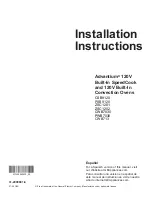
26
the oven. Check the settings after you start the oven
to ensure the oven is operating as desired. Do not
operate the oven with the door open or alter the door
safety latches in any way. Do not operate the oven if
there is an object between the door seals and sealing
surfaces.
Individuals with PACEMAKERS should check with
their doctor or the manufacturer of the pacemaker for
precautions regarding microwave ovens.
To avoid the possibility of electric shock
Under no circumstances should you remove the outer
cabinet. Never spill or insert any objects into the door
lock openings or ventilation openings. In the event of
a spill, turn off and unplug the oven immediately and
call an authorised service agent. Do not immerse the
power supply cord or plug in water or any other liquid.
Do not allow the power supply cord to run over any
hot or sharp surfaces, such as the hot air vent area at
the top rear of the oven.
If the power supply cord of this appliance is
damaged, it must be replaced with a special cord.
The exchange must be made by an authorised
service agent.
To avoid the possibility of explosion and sudden
boiling
Never use sealed containers. Remove seals and lids
before use. Sealed containers can explode due to a build
up of pressure even after the oven has been turned off.
Take care when microwaving liquids. Use a wide-
mouthed container to allow bubbles to escape.
To prevent sudden eruption of boiling liquid and
possible scalding:
• Stir liquid prior to heating/reheating.
• It is advisable to insert a glass rod or similar
utensil into the liquid whilst reheating.
• Let liquid stand for at least 20 seconds in the oven
at the end of cooking time to prevent delayed
eruptive boiling.
Pierce the skin of such foods as potatoes, sausages
and fruit before cooking, or they may explode.
To avoid the possibility of burns
Use pot holders or oven gloves when removing food
from the oven to prevent burns. Always open
containers, popcorn makers, oven cooking bags, etc.,
away from the face and hands to avoid steam burns.
Temperature of the container is not a true indication
of the temperature of the food or drink; always check
the food temperature. Always stand back from the
oven door when opening to avoid burns from
escaping steam and heat. Slice stuffed baked foods
after heating to release steam and avoid burns.
Do not lean or swing on the oven door. Do not play
with the oven or use it as a toy. Children should be
taught all important safety instructions: use of pot
holders, careful removal of food coverings; paying
special attention to packaging (e.g. self-heating
materials) designed to make food crisp, as they may
be extra hot.
Other warnings
Never modify the oven in any way. This oven is for
home food preparation only and may only be used for
cooking food. It is not suitable for commercial or
laboratory use.
To promote trouble-free use of your oven and
avoid damage
Never operate the oven when it is empty. Doing so
may damage the oven. When using a browning dish
or self-heating material, always place a heat-resistant
insulator such as a porcelain plate under it to prevent
damage to the turntable and turntable support due to
heat stress. The preheating time specified in the
dish’s instructions must not be exceeded. Do not use
metal utensils, which reflect microwaves and may
cause electrical arcing. Do not put cans in the oven.
Only use the turntable and the turntable support
designed for this oven. Do not operate the oven
without the turntable.
To prevent the turntable from breaking:
• Before cleaning the turntable with water, leave
the turntable to cool.
• Do not put hot foods or hot utensils on a cold
turntable.
• Do not put cold foods or cold utensils on a hot
turntable.
Do not place anything on the outer cabinet during
operation.
IMPORTANT!
If you are unsure how to connect
your oven, please consult an authorised,
qualified electrician.
Neither the manufacturer nor the dealer can accept
any liability for damage to the oven or personal injury
resulting from failure to observe the correct electrical
connection procedure. Water vapour or drops may
occasionally form on the oven walls or around the
door seals and sealing surfaces. This is a normal
occurrence and is not an indication of microwave
leakage or a malfunction.
2_Zanker_English_CS_Z16_CD_Layout 1 30/03/2017 08:11 Page 26
















































